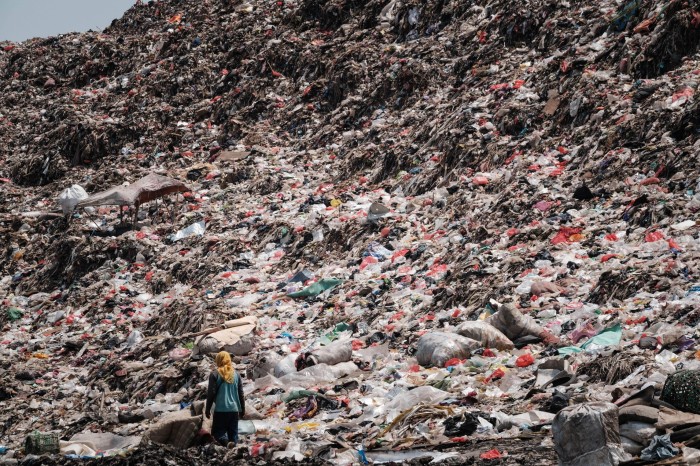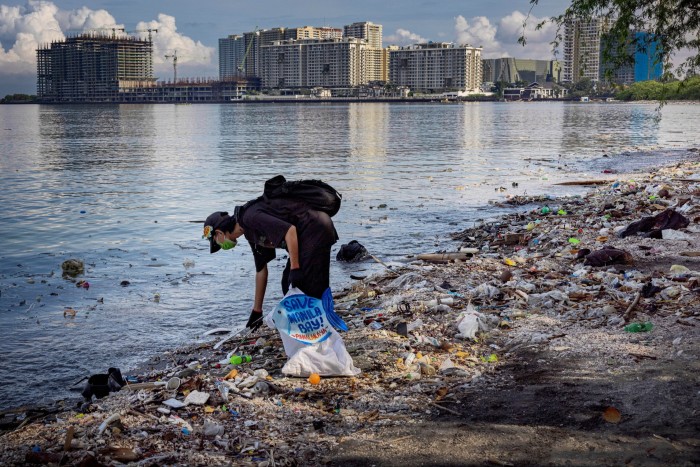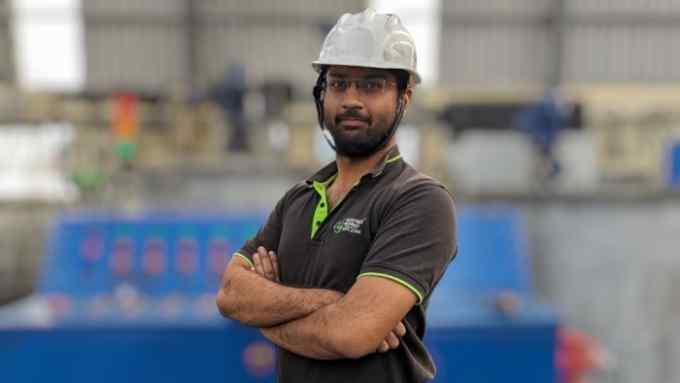Plastics prove tough target for circular treatment

Roula Khalaf, Editor of the FT, selects her favourite stories in this weekly newsletter.
Today’s enlightened consumers may shun plastic straws and avoid plastic bags — indeed, legislators give them no choice in many jurisdictions — but they are swimming against a mighty tide. Plastic’s cheapness, lightness and versatility make it economically irresistible, even though the environmental downsides are severe.
According to the OECD, global plastic production reached 460mn tonnes in 2019. Of that, three-quarters ended up as waste — with most going into landfill, but 22mn tonnes leaking into the environment, including bodies of water. “Every day, the equivalent of over 2,000 garbage trucks full of plastic is dumped into our oceans, rivers and lakes,” said António Guterres, the UN secretary-general, in June 2023.
The circular economy, insist politicians and businesses, is the solution: a system, in the words of campaigning organisation the Ellen MacArthur Foundation, “where materials never become waste and nature is regenerated”. Bringing that about will mean, it says, producing less plastic, and making sure that what is produced is reusable and recyclable — goals that several global initiatives, notably a proposed UN treaty, are trying to achieve.
What balance to strike between them, however, is hotly contested, with significant technical challenges also hindering progress.
“Most countries, when they talk about a circular economy, just mean recycling,” argues Vito Buonsante, a Brussels-based environmental health lawyer. “If the plastics industry were to try to become truly circular, it would need to follow resource efficiency principles, whereby, like compost from food waste replacing fertilisers, something is put back into the economy that saves virgin materials, energy and money.”
But it is, he says, “much more difficult” to make the economic case for resource efficiency in the plastics industry: “The fossil fuels from which plastics are produced continue to be subsidised, and recycling plastics is expensive given the number of different products on the market.”
That variety is indicative of another problem: the cocktail of chemicals used to give plastics their myriad properties. A May 2023 report from the UN Environment Programme concluded that, of the more than 13,000 chemicals associated with plastics and their production, more than 3,200 were “of potential concern due to their hazardous properties”.
“Toxic chemicals in plastics complicate their reuse and disposal, and hinder recycling,” explains Bethanie Carney Almroth, a professor at the University of Gothenburg, Sweden. She recently co-authored a study that examined pellets from recycled plastic from 13 countries and found they contained “hundreds of toxic chemicals, including pesticides and pharmaceuticals”.
“The priority has to be reducing the production of plastics and making them less toxic,” Buonsante says. “No plastics are known to be safe and circular.”
Others are more optimistic, though. For Jodie Roussell, global public affairs lead for packaging and sustainability at food company Nestlé, the key is “good collection, [and] solid separation” to avoid contamination.
“You can have a circular economy for plastics, but you have to have the right conditions,” she says — citing “bottle-to-bottle PET”, or polyethylene terephthalate recycling. “Non-food-grade plastics used in cleaning products, electronics or the building sector should never be recycled into food-grade material,” she adds.

Even when done in the right way, there are limits to recycling — or at least to the so-called mechanical recycling that is the global norm, where waste plastic is sorted, shredded, melted and turned into pellets for manufacturers to reuse. “Chemical manufacturing”, where heat and chemical processes in effect reduce plastics to their raw ingredients, is far less common, and has been dogged by concerns over pollution and energy use.
According to a report from, BEUC, the European consumer organisation, companies’ claims about the recyclability of their plastic bottles are questionable. “Plastic is not circular or infinitely recyclable,” it said. “The recycling process degrades plastic, meaning that, after a certain number of recycling cycles, virgin material must be added to maintain quality.”
Roussell suggests that an “open loop view” is the answer — in contrast to “closed loops”, where, say, drink bottles are recycled into drink bottles. In an open loop system, she says, though PET may live “several lives as a bottle”, it could then go on to have future lives in the building or clothing sectors.
Efforts to try to tackle the plastics problem, with the circular economy at the heart of any solution, acquired new momentum in March 2022, when the UN’s member states resolved to establish a legally binding agreement by the end of 2024 to prevent plastic pollution. The third of five rounds of negotiations took place in Nairobi earlier this month.
For the treaty to be “genuinely disruptive”, countries will need to agree “to reduce the production of plastics globally and make plastics without toxic chemicals”, suggests Buonsante. That, however, may be a step too far for some countries — especially those that pump a lot of the oil that plastics are made from.
While the so-called High Ambition Coalition to End Plastic Pollution — which includes the EU, Canada, Japan and Australia — called in Nairobi for curbs on plastic production, a newly formed Global Coalition for Plastics Sustainability, including Saudi Arabia, Russia, Iran and China, rejected production limits and emphasised recycling instead.
How this difference resolves itself will become clear only towards the end of next year. But Rebecca Marmot, chief sustainability officer at consumer goods company Unilever, says that, by setting binding global rules, the treaty has “the potential to reshape the world’s relationship with plastic, accelerate the transition towards a circular economy, and end plastic pollution”.
Along with Nestlé and dozens of other big consumer brands, Unilever is a member of the Business Coalition for a Global Plastics Treaty, a grouping convened by the Ellen MacArthur Foundation and wildlife campaign group WWF. Its vision is a “circular economy in which plastic never becomes waste or pollution, and the value of products and materials is retained in the economy”.
This entails “reduction of plastic production and use” and “whenever possible” moving away from single-use plastics in favour of “reusable and more durable solutions”. Applied widely enough, such policies could “reduce annual volumes of plastic pollution by at least 80 per cent by 2040 compared to business-as-usual, and achieve near-zero plastic pollution by 2060 globally”, the coalition says.
Roussell says Nestlé is carrying out “20 pilots in 12 countries” for “different reuse and refill business models”. But she stresses that a wider transition will need regulation and industry-wide collaboration.
“Reuse and refill requires a system shift and multiple actors need to add different elements to their business models,” she says. “If one can dream a dream, certain approaches to rolling out reuse would be included in the treaty — to create standardisation, cost savings and simplicity.”
Consumers, too, will need to learn new habits. “We need to incentivise behaviour change and create compelling user experiences and value propositions because, today, refill and reuse are less convenient for the consumer,” Roussell says. She cites a Nestlé study which showed that, in the UK, “only people without children are using reuse and refill in significant ways”.
Carsten Wachholz, global plastics treaty co-lead at the Ellen MacArthur Foundation, agrees that systemic change is needed — and soon.
“We must change how we design and use plastics as we cannot simply recycle or reduce our way out of this crisis,” he says. “Now is the time for tougher policy and accelerated business action.”

Comments